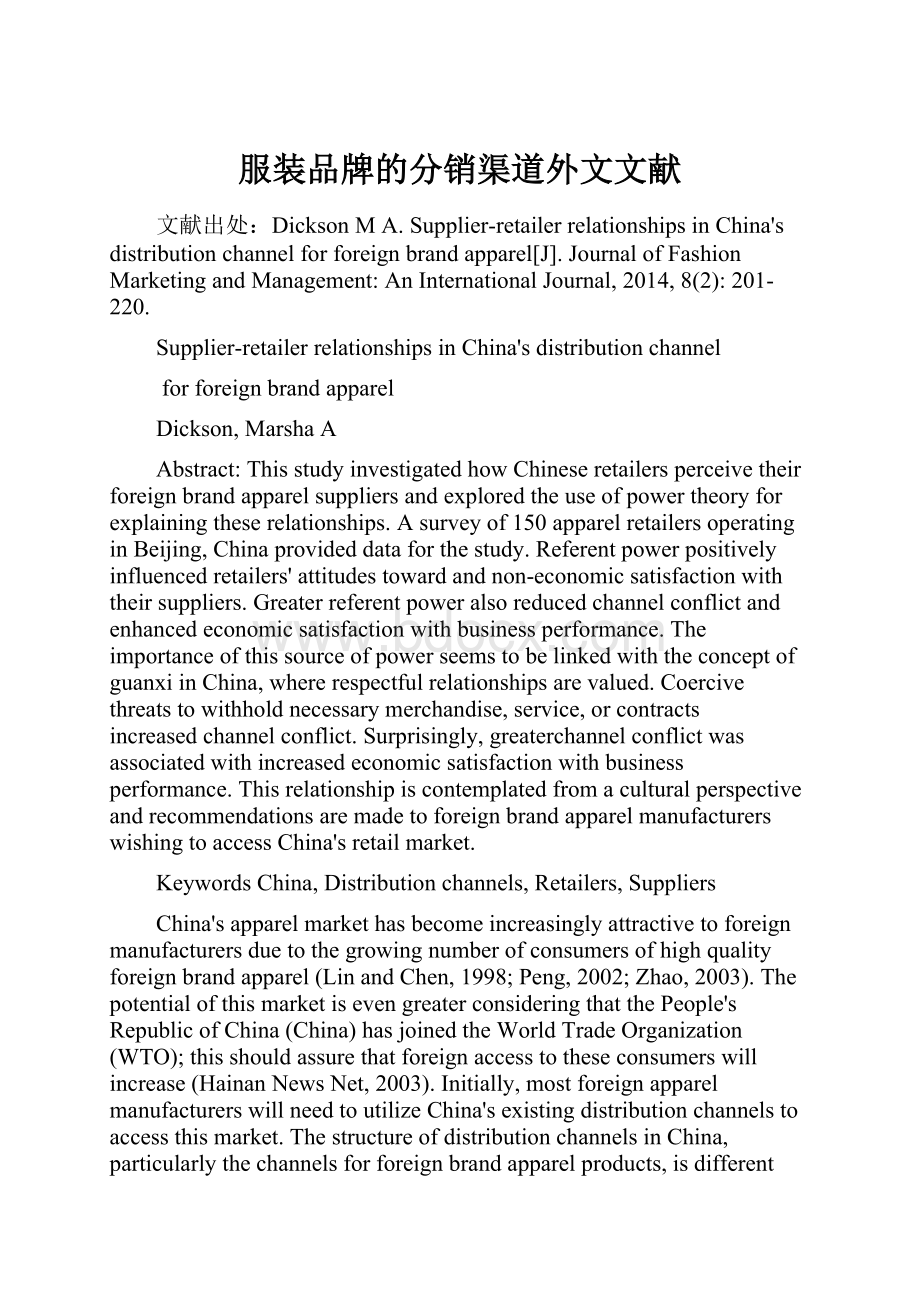服装品牌的分销渠道外文文献.docx
《服装品牌的分销渠道外文文献.docx》由会员分享,可在线阅读,更多相关《服装品牌的分销渠道外文文献.docx(24页珍藏版)》请在冰豆网上搜索。

服装品牌的分销渠道外文文献
文献出处:
DicksonMA.Supplier-retailerrelationshipsinChina'sdistributionchannelforforeignbrandapparel[J].JournalofFashionMarketingandManagement:
AnInternationalJournal,2014,8
(2):
201-220.
Supplier-retailerrelationshipsinChina'sdistributionchannel
forforeignbrandapparel
Dickson,MarshaA
Abstract:
ThisstudyinvestigatedhowChineseretailersperceivetheirforeign brand apparelsuppliersandexploredtheuseofpowertheoryforexplainingtheserelationships.Asurveyof150apparelretailersoperatinginBeijing,Chinaprovideddataforthestudy.Referentpowerpositivelyinfluencedretailers'attitudestowardandnon-economicsatisfactionwiththeirsuppliers.Greaterreferentpoweralsoreduced channel conflictandenhancedeconomicsatisfactionwithbusinessperformance.TheimportanceofthissourceofpowerseemstobelinkedwiththeconceptofguanxiinChina,whererespectfulrelationshipsarevalued.Coercivethreatstowithholdnecessarymerchandise,service,orcontractsincreased channel conflict.Surprisingly,greaterchannel conflictwasassociatedwithincreasedeconomicsatisfactionwithbusinessperformance.Thisrelationshipiscontemplatedfromaculturalperspectiveandrecommendationsaremadetoforeign brand apparelmanufacturerswishingtoaccessChina'sretailmarket.
KeywordsChina,Distributionchannels,Retailers,Suppliers
China'sapparelmarkethasbecomeincreasinglyattractivetoforeignmanufacturersduetothegrowingnumberofconsumersofhighqualityforeignbrandapparel(LinandChen,1998;Peng,2002;Zhao,2003).ThepotentialofthismarketisevengreaterconsideringthatthePeople'sRepublicofChina(China)hasjoinedtheWorldTradeOrganization(WTO);thisshouldassurethatforeignaccesstotheseconsumerswillincrease(HainanNewsNet,2003).Initially,mostforeignapparelmanufacturerswillneedtoutilizeChina'sexistingdistributionchannelstoaccessthismarket.ThestructureofdistributionchannelsinChina,particularlythechannelsforforeignbrandapparelproducts,isdifferentfromthoseinfreemarketsliketheUSAandotherdevelopedcountries(McClainandCheng,1995;SternquistandZhou,1995;Zhangetal.,2002).Scholarsarguethatresearchonretaildistributionchannelsinlessdevelopedcountries(LDCs),suchasChina,isimperativeifwesternscholarsandmarketersaretounderstandthepromisingLDCmarketsandpromoteexportstothemarkets(Goldman,1981;Samiee,1993).Thus,thepurposeofthisstudywastoexaminetheretaildistributionchannelsforforeignbrandapparelinChina.Specifically,weinvestigatedhowChineseretailersperceivetheirforeignbrandapparelsuppliersandexploredtheuseofpowertheoryforexplainingtheserelationships.Powertheoryarguesthatsomechannelparticipantshavepoweroverothers(El-AnsaryandStern,1972;HuntandNevin,1974).Knowledgeaboutthesourcesfromwhichpowerarises,howpowerisperceived,anditsimpactonbusinessrelationshipshaveimplicationsforforeignbusinessesthatwishtotaptheretailmarketinChina.
PoliticalandculturalinfluencesondistributionchannelsinChina
Chineseretailersoperateinanenvironmentdefinedbyanumberofmacrofactors,includingpoliticalandculturalfactors,affectingtheretailersandtheirchannelmembers(Kwanetal.,2003).AnexampleoftheinfluenceofpoliticalfactorsistherestrictivegovernmentregulationsrelatedtoimportingconsumergoodsintoChina.TheChinesegovernmentassignsforeigntradelicensestoalimitednumberoforganizationsandenterprises;onlythoseentitiesthathavebeenassignedlicensescanengageinforeigntrade(MinistryofForeignTradeandEconomicCooperation,PRC,2003;USDeptofCommerce,1999).BeforeApril1999,averylimitednumberofstate-ownedandtownshipenterprisesweregrantedtherightstoconductdirectexportandimportbusiness(HongKongTradeDevelopmentCouncil,1999).AfterApril1999,moreenterpriseshavebeenauthorizedforexportingandimportingbutstillonlyasmallnumberofprivateindustrialenterprises,massmerchandiseretailenterprises,andscientificandresearchinstitutionshavebeengrantedforeigntradeautonomy(ChinaCentralTelevision,1999;HongKongTradeDevelopmentCouncil,1999).ArecentinterviewbythesecondauthorwithagovernmentalofficialworkingattheBeijingBureauofIndustryandCommerceAdministrationrevealedthataconsiderablenumberofBeijingretailerswhowanttosellimportedapparelproductscannotdirectlyengageinforeigntrade.ConsequentlymostChineseapparelretailersmustrelyonforeigntradeoperatorstoactastheirexport/importagentstoobtainimportedapparel(Peng,2002;Zhangetal.,2002).
ChineseretailerscanobtainforeignbrandnameproductsthroughasecondchannelthatdistributesproductsthatweremanufacturedinChina(LinandChen,1998;Zhangetal.,2002).Forforeignapparelmanufacturersproducingtheirproductsinjoint-ventureenterprisesinChina(definedascollaborativeapparel),ChineselawallowsaportionoftheirproductstobesoldwithinChina.However,collaborativeapparelproductsmustgothroughthelocaldistributionchannelinordertoreachtheretailfloor.Similartothesituationwithimports,withonlyafewexceptions,thislocaldistributionchannelhasbeenclosedtoforeigninvestors.Therefore,forChineseretailerswishingtooffereitherimportedorcollaborativeapparelwithforeignbrandnames,theytypicallymustaccesstheseproductsindirectlythroughforeigntradeoperators(suppliers)(Zhangetal.,2002).
Aswellasmaintainingcontroloverimportingandexporting,theChinesegovernmentalsocontrolsthedistributionchannelsforconsumergoodsPeptofCommerce,1999;HongKongTradeDevelopmentCouncil,1999).MostChinese-Foreignjoint-ventureenterprisesareprohibitedfromengagingindistributionactivitiessuchaswholesaling(TheWorldJournal,1999a)[1].Whollyforeign-investeddistributionandwholesalingbusinessesareallowedonlyinthefourcitiesofBeijing,Shanghai,Tianjin,andChongqing,whicharedirectlyadministeredbythecentralgovernment(TheWorldJournal,1999a,b).Thus,formostforeignapparelmanufacturers,criticalaccesstoChina'sretailmarketwillbecontrolledbyaChineseagentwhoactsasthesupplierforChineseretailers.Foratleasttworeasons,itwouldbevaluabletounderstandtherelationshipsthesesuppliershavewithChineseretailers.First,mostforeignapparelmanufacturersarelikelytorelinquishsomecontrolovertheirbusinesstotheseagents.Itwouldbehelpfultoconsiderhowretailersperceivetheseagents.Second,astheChinesegovernmentfurtherrelaxesrestrictionsonforeigninvolvementinimportinganddistribution,foreignapparelmanufacturerswilleventuallybeallowedtoengagedirectlywithChineseretailers.Thesebusinesseswouldbenefitfromknowinghowretailersperceivedistribution-relatedactivitiesandbusinessstrategies,andhowpowerismaintainedwithintheserelationships.
BecausepowertheorywasdevelopedprimarilyintheUSA,theinfluenceofChina'suniqueculturalfactorsmustbeconsideredwhenexaminingrelationshipsamongforeignbrandapparelsuppliersandChineseretailers.Thestructureofadistributionchannelisinfluencedbyitssocialandculturalcontext(OlsenandGranzin,1990).TwofactorsinfluencingChinesebehaviorareguanxiand"face"(KimandNam,1998).GuanxireferstotheinformalnetworksandrelationshipsgoverningbusinessactivitythroughoutChina.Guanxirelationshipscontrastwiththemorelegal,contract-basedrelationshipsfoundinthewesternworld(Lovettetal.,1999).Withguanxi,relationshipsarestrengthened"throughexchangesofrespectandaffection,aswellasmaterialobjectsorspecificfavors"(Lovettetal.,1999,p.232).Lovettetal.(1999)provideexamplessupportingthecentralityofrelationshipsandtrusttobuyer-supplierrelationshipsinaguanxi-type.businesssystem.Guanxiprovidesassurancetobuyersthattheyarehighprioritytosuppliers,thatthesuppliershavetheneededabilitytosatisfythebuyers'needs,andthatsupplierswillnotcheatthem.Kwanetal.(2003)suggestthatforeignerswishingtobeinvolvedintheretailbusinessinChinashouldcultivategoodguanxiwithChinesebureaucratsbecauseitmayinfluencewhetherregulationsareinterpretedinamannerthatfavorstheforeignbusiness.
AsecondculturalfactorpotentiallyimpactingrelationshipswithinChina'sdistributionchannelsisthatofface.AmongAsians,facerefersto:
...therespectabilityand/ordeferencewhichapersoncanclaimforhimselffromothers,byvirtueoftherelativepositionheoccupiesinhissocialnetworkandthedegreetowhichheisjudgedtohavefunctionedadequatelyinthatpositionaswellasacceptablyinhisgeneralconduct(Ho,1976,p.883).
KimandNam(1998)believethatconcernwithfacestemsfromAsia'scollectivistculture,whereharmoniousandinterdependentrelationshipsamonggroupsaredesired.Generally,Asianswishtoextendapositiveimageofthemselvestoothers.FaceislinkedwithsocialstatusandlosingfaceisthoughttobegreatlyconcerningtoChinesebecauseitbringsquestiontowhetheraperson'ssocialstatusislegitimate.KimandNam(1998)linkfacewithpowerinbusinesssettingsbyproposingthatmanagementishighlysensitivetoface-savingandhasresponsibilityformaintainingandcultivatingthesocialnetworksneededtocreatesuccessfulworkingrelationshipsamongpersons/groupswithdifferingsocialstatusandpower.Oneisexpectedtosavethefaceofanyonewithwhomonehasguanxirelationships,oranticipateretaliationfromthosewhosefacehasnotbeensaved(Luketal.,1999).Althoughwedidn